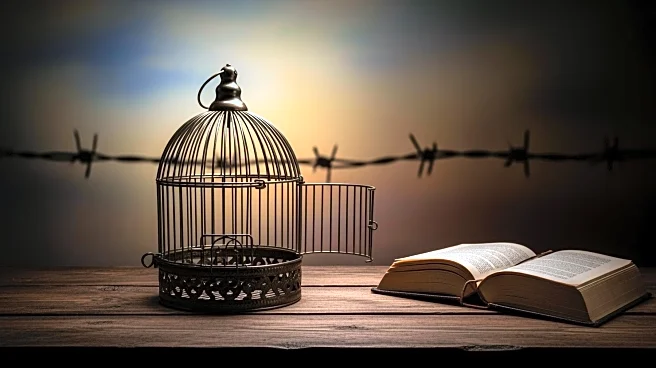What's Happening?
A Russian court has extended the detention of Diana Loginova, an 18-year-old street singer, for performing anti-war songs. Loginova, a member of the Stoptime street band, has been sentenced to consecutive
13-day prison terms for violating public order during her October performance. The court in St. Petersburg has ordered her to remain in custody and pay fines for 'discrediting the Russian armed forces.' Human rights activists, including Amnesty International, have condemned the repeated detentions as a crackdown on free speech amid the ongoing war in Ukraine. The case has sparked solidarity performances across Russia, leading to further arrests and fines.
Why It's Important?
The extension of Loginova's detention highlights the increasing suppression of dissent and free speech in Russia following its invasion of Ukraine. This action reflects a broader trend of targeting individuals and groups opposing the Kremlin's narrative, impacting civil society, independent media, and human rights organizations. The crackdown could further isolate Russia internationally and exacerbate tensions with Western nations advocating for human rights and freedom of expression. The situation underscores the risks faced by artists and activists in Russia, potentially stifling cultural and political discourse.
What's Next?
The continued detention of Loginova and her bandmates may lead to increased international scrutiny and pressure on Russia to uphold human rights standards. Human rights organizations are likely to intensify their calls for the release of detained artists and activists. The case could inspire more solidarity performances and protests within Russia, challenging the government's narrative and potentially leading to more arrests. The international community may respond with diplomatic measures or sanctions aimed at addressing human rights violations.
Beyond the Headlines
The case of Diana Loginova raises ethical questions about the balance between national security and individual freedoms. It highlights the cultural dimension of resistance through music and art, serving as a form of protest against authoritarianism. The situation may influence long-term shifts in Russian society, encouraging underground movements and alternative forms of expression. The crackdown on dissent could lead to a cultural brain drain, with artists and intellectuals seeking refuge in countries with greater freedom of expression.










